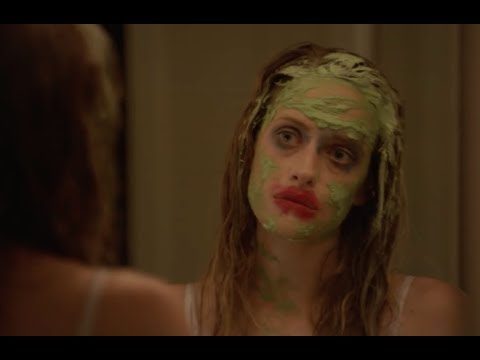In New Year, New You, an entry in Hulu’s Into the Dark series of brisk, ninety-minute horror films, Sophia Takal (Always Shine) manages the difficult task of making a millennial satire–complete with Instagram influencers, self-help jargon, and vlogs–that feels neither completely insipid nor completely out-of-touch with the world it’s skewering. It helps that Takal grounds the comedy in a tense thriller plot. Neither the suspense-horror nor the satire are completely successful on their own terms, but they ratchet each other along nicely, keeping things entertaining enough that it’s not too tempting to poke at the film’s lapse in logic.
Takal’s Always Shine dealt with toxic friendships and envy, and she returns to that territory here, complicating things by making the central relationship a collective one: a group of high school friends reunited for a New Year’s party, each with her own baggage and her own opinion of her success (or lack thereof) in relationship to her friends’. The party’s host is Alexis (Suki Waterhouse), a brittle young woman whose acting dreams went nowhere, who is now working as a babysitter and interviewing for jobs as a hostess. She’s joined by Kayla (Kirby Howell-Baptiste), the group’s most stable member, with an emotionally rewarding and significant career in what appears to be social work, and Chloe (Melissa Bergland), who covers up her insecurity with a stream of jokes. Early on in the party, the three of them have only one real topic of conversation, one which keeps circling back, egged on by both Chloe’s curiosity and Alexis’s bitterness: their friend Danielle (Carly Chaikin), who has gone on to become a rich and famous influencer and health/fitness/mental well-being vlogger. Danielle was reportedly happy to get her invitation to the party, but will she actually show?
She does, and the film becomes a tense two-hander between Waterhouse and Chaikin, with the viewer’s sympathies undecided. It’s easy to view Danielle’s career as shallow and egotistical, but she’s genuinely good at reestablishing intimacy with friends she hasn’t seen in a long time, and if her “love yourself” advice is canned, she delivers it with believable warmth, making Alexis’s occasional side-swipes at her feel awkwardly cruel rather than deserved. But then Alexis will make a valid point, cutting through Danielle’s long speech about what made her give up dairy with the point that Danielle’s viewers shouldn’t really be writing into her for health advice–“They know you’re not a doctor, right?” And then the fundamental all-polish-no-substance quality of Danielle’s show will resurface, as she makes a video of Kayla talking about her girlfriend but has to interrupt it partway through to rerecord: they don’t really talk about politics, she tells the black, lesbian Kayla, because it’s just too depressing, and it might alienate viewers who don’t share her political stances. (In a nice little moment of acting by Howell-Baptiste, Kayla is visibly but quietly diminished by this bit of optimistic censorship.) The bubbling sense of danger mounts as the group moves on to playing “Never Have I Ever,” a game that makes the gulf between Danielle’s life and everyone else’s even clearer and ramps up Alexis’s open contempt. Something has to give, and it does, both in a present development and an underbaked twist.
The film never quite gets a handle on the history that it implies between the characters–and still less between them and another friend, who is only mentioned–but Takal actually turns at least some of that fault to her advantage, crafting a narrative in which characters’ official motivations don’t match what’s actually in their hearts. When the movie gets into more slasher-like territory, it gets both more familiar and more depressingly predictable, and the climax is weak. But Takal remains a filmmaker to watch, one with a good eye for rivalry, envy, and the eruption of anger into an otherwise civilized life.

